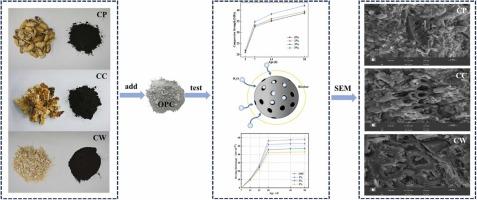Comparative study on the effect of agricultural waste biochar on the properties of cement mortar
IF 6.2
1区 农林科学
Q1 AGRICULTURAL ENGINEERING
引用次数: 0
Abstract
Biochar is an organic material prepared by anaerobic pyrolysis and is extensively used in the building materials industry for its excellent carbon sequestration performance. This study used biochar prepared by pyrolysis of agricultural wastes (peanut shells, corncob and wood chips) to prepare biochar mortar by replacing cement in different proportions (1.0 %, 3.0 % and 5.0 %). The workability, mechanical strength, shrinkage properties, phase composition and microstructure of biochar cement mortar have been systematically studied. The results show that the fluidity of the cement mortar decreases significantly with increasing biochar substitution rate, which is on the order of that of peanut shell biochar, corncob biochar, and wood biochar. The mechanical strength of the cement mortar increases and then decreases with the biochar substitution rate, reaching optimality at 3.0 %. Among them, peanut shell biochar mortar had the best mechanical properties, and its 28d flexural and compressive strengths were higher than those of ordinary cement mortar by 6.6 % and 8.8 %, respectively. Moreover, the shrinkage of cement-based materials progressively decreases as the biochar substitution rate increases, and the 28 d shrinkage rate of peanut shell biochar mortar was 25.3 % lower than that of ordinary mortar. The results of microscopic analysis showed that the main mineral components of cement-based materials prepared by biochar were Ca(OH)2, CaCO3, ettringite and C-S-H gel. Peanut shell biochar exhibits excellent carbon sequestration properties. Cement mortar with 3.0 % peanut shell biochar reduced CO2 emissions by 19.0 % compared to regular cement mortar.

农业废弃物生物炭对水泥砂浆性能影响的对比研究
生物炭是一种通过厌氧热解制备的有机材料,因其优异的固碳性能被广泛应用于建材行业。本研究利用农业废弃物(花生壳、玉米芯和木屑)热解制备的生物炭,以不同比例(1.0 %、3.0 %和5.0 %)替代水泥制备生物炭砂浆。系统地研究了生物炭水泥砂浆的和易性、机械强度、收缩性能、物相组成和微观结构。结果表明:随着生物炭替代率的增加,水泥砂浆的流动性显著降低,其替代率依次为花生壳生物炭、玉米芯生物炭和木材生物炭;水泥砂浆的机械强度随生物炭替代率先增大后减小,在3.0 %时达到最佳。其中,花生壳生物炭砂浆力学性能最好,其28d抗折强度比普通水泥砂浆分别提高6.6 %和8.8 %。此外,随着生物炭替代率的增加,水泥基材料的收缩率逐渐降低,花生壳生物炭砂浆的28 d收缩率比普通砂浆低25.3 %。微观分析结果表明,生物炭制备的水泥基材料主要矿物成分为Ca(OH)2、CaCO3、钙矾石和C-S-H凝胶。花生壳生物炭具有优异的固碳性能。与普通水泥砂浆相比,含有3.0 %花生壳生物炭的水泥砂浆减少了19.0 %的二氧化碳排放量。
本文章由计算机程序翻译,如有差异,请以英文原文为准。
求助全文
约1分钟内获得全文
求助全文
来源期刊

Industrial Crops and Products
农林科学-农业工程
CiteScore
9.50
自引率
8.50%
发文量
1518
审稿时长
43 days
期刊介绍:
Industrial Crops and Products is an International Journal publishing academic and industrial research on industrial (defined as non-food/non-feed) crops and products. Papers concern both crop-oriented and bio-based materials from crops-oriented research, and should be of interest to an international audience, hypothesis driven, and where comparisons are made statistics performed.
 求助内容:
求助内容: 应助结果提醒方式:
应助结果提醒方式:


